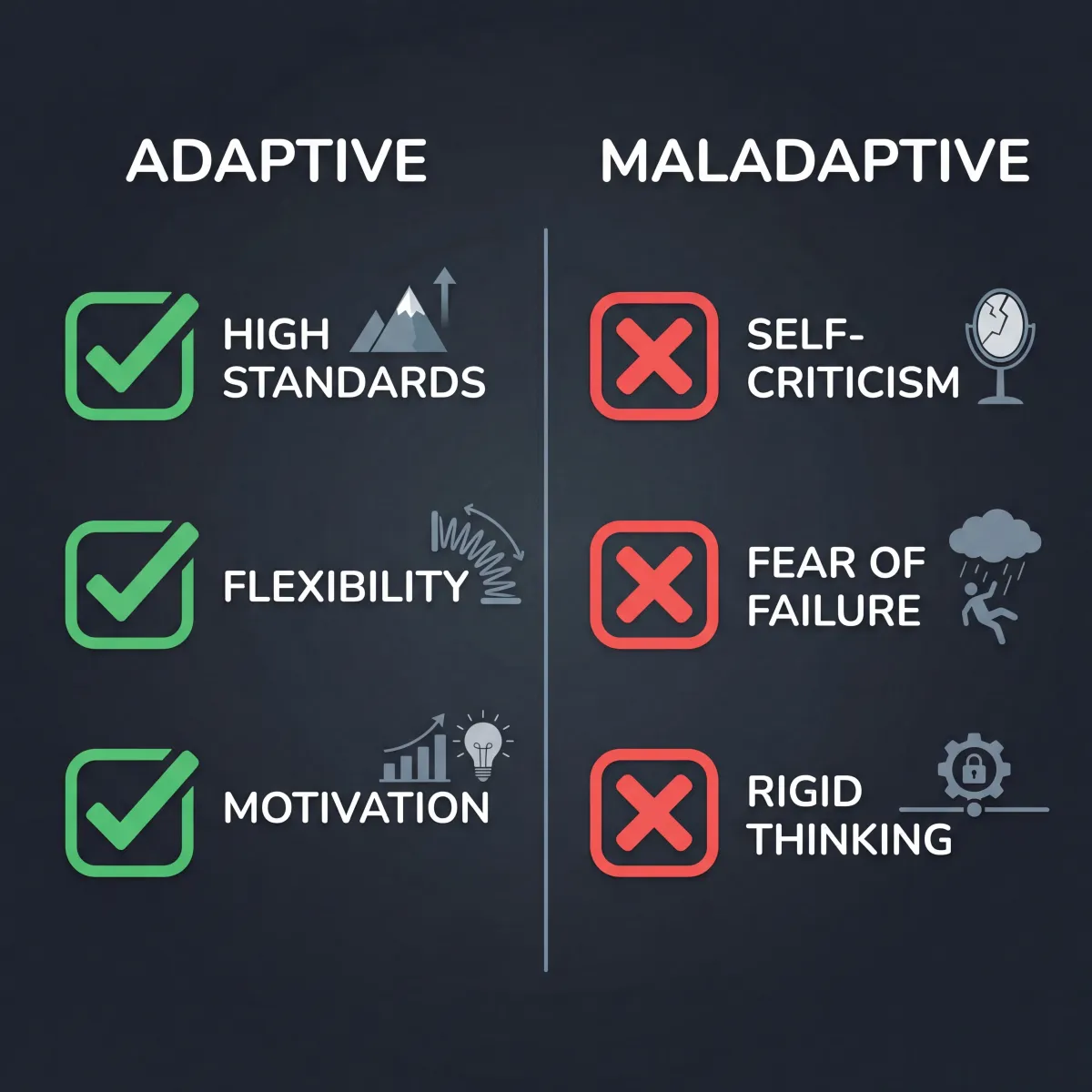Perfection: The 21st Century's Illusion
Perfectionism is rising across generations, fueling anxiety, depression, and eating disorders. Learn what research says about breaking free from impossible standards.
11 Min Read
What Perfectionism Actually Is (and What It Isn't)
Salvador Dali once said, "Have no fear of perfection, you will never reach it." Decades later, that line reads less like wisdom and more like a warning most of us chose to ignore.
Wanting to do well is not the same thing as perfectionism. You can set hard goals and chase them while still accepting that you will mess up sometimes. Perfectionism goes further. It says anything less than flawless is a failure, and it runs on fear — of making mistakes, of being judged, of not being enough.
Psychologists split it into two forms. Adaptive perfectionism is high standards plus the ability to shrug off mistakes. Maladaptive perfectionism is high standards plus brutal self-criticism when you fall short. One keeps you moving. The other keeps you stuck. A review of 416 studies covering more than 113,000 participants found that the maladaptive kind shows medium-strength correlations with anxiety, OCD, and depression.
Perfectionism is not about high standards. It is about the fear that who you are, without those standards, is not enough.
People defend their perfectionism as ambition all the time. But ambition moves you forward. Perfectionism keeps you frozen — still revising a project that was fine three drafts ago, or never starting because you might do it wrong.

Why Perfectionism Has Surged in the Modern Era
Perfectionism is not new. What is new is how much worse it has gotten. Curran and Hill analyzed data from over 40,000 college students across three decades and published their findings in the Psychological Bulletin. Between 1989 and 2016, socially prescribed perfectionism (the feeling that others demand perfection from you) rose 33 percent. Self-oriented perfectionism went up 10 percent. Each generation they measured was more perfectionistic than the last.
A few things are driving this. University admissions have gotten more competitive. Economic instability has turned career success from a preference into a survival question. And social media created a permanent gallery of other people's best moments, available for comparison at 2 a.m. on a Tuesday.
The message a whole generation absorbed is: you have to be exceptional just to be acceptable. That pressure does not make people excellent. It makes them burned out, anxious, and exhausted in ways that no productivity hack can touch.
| Perfectionism Type | Change (1989-2016) | What It Means |
|---|---|---|
| Self-Oriented | +10% | Imposing unrealistic standards on yourself |
| Other-Oriented | +16% | Demanding perfection from people around you |
| Socially Prescribed | +33% | Believing others expect you to be perfect |
The Three Faces of Perfectionism
Paul Hewitt and Gordon Flett identified three dimensions of perfectionism in the early 1990s. The framework still shapes how clinicians think about it. Knowing which type fits you matters, because each one breaks down differently.
Self-oriented perfectionism means holding yourself to standards that leave zero room for error. The goals are technically achievable, but the target keeps moving. When you fall short, the feeling is shame, not motivation. This type tracks closely with depression and emotional exhaustion.
Other-oriented perfectionism points outward. You expect flawless behavior from partners, coworkers, and friends. Nobody can meet standards that exist mostly in your head, so relationships take the hit. People with high other-oriented perfectionism tend toward conflict and isolation.
Socially prescribed perfectionism is the worst of the three. It is the belief that everyone around you, parents, employers, followers, requires you to be perfect, and that their acceptance depends on your performance. A review of three decades of research found that this form is consistently linked to depression and suicidal ideation.
Most people carry some mix of all three. But socially prescribed perfectionism has spiked the hardest among young adults, and economic pressure plus social media have a lot to do with it.
How Perfectionism Damages Your Mental Health
Perfectionism does not just make you stressed. It rewires how you interpret normal experiences. A small mistake becomes proof that you are fundamentally not good enough. A compliment gets dismissed as politeness. Constructive criticism? That just confirms what you already suspected.
The World Health Organization estimates that over a billion people live with mental health conditions. Perfectionism both feeds those conditions and stops people from getting help. If you believe you should handle everything on your own, admitting you need support feels like failing.
| Mental Health Outcome | Correlation with Perfectionism | Evidence Base |
|---|---|---|
| Depression | Medium (r = .38-.43) | 416 studies, 113,000+ participants |
| Anxiety Disorders | Medium (r = .38-.43) | Meta-analysis, Callaghan et al. 2024 |
| OCD Symptoms | Medium (r = .38-.43) | Cognitive Behaviour Therapy journal |
| Eating Disorders | Medium (r = .33-.40) | 95 studies, 32,840 participants |
| Suicidal Ideation | Consistent link | Three decades of longitudinal data |
Perfectionism also feeds procrastination in a way that is hard to see from the outside. If the only acceptable outcome is perfection, starting feels risky. Why begin something you might do badly? So you avoid it. But the less you do, the more anxious you get about doing anything, and the stakes keep climbing.
If you have noticed persistent worry, restlessness, or physical tension that will not ease, perfectionism may be amplifying anxiety you have been attributing to other causes.

Are Curated Lives Making Perfectionism Worse?
A study published in BMC Public Health surveyed 3,424 high school students and found that adolescents who focused heavily on self-presentation on social media had 3.32 times higher odds of receiving an eating disorder diagnosis. Social comparison on these platforms showed positive associations with both perfectionism and disordered eating.
Social media does not show you reality. It shows you a curated selection of other people's best moments, filtered and staged. You compare your unedited life to someone else's highlight reel, and you lose every time. Previous generations compared themselves to a handful of peers. Now it is thousands of strangers, all at once, all day.
This is not a minor irritation. It reshapes your baseline expectations for what normal life should look like. Your apartment should look like an interior design account. Your meals should be photogenic. Your body should match whatever the current aesthetic demands. Your career should be advancing at the pace of whatever 25-year-old founder just got profiled in a magazine.
The gap between curated perfection and lived reality breeds the kind of chronic dissatisfaction that drives people toward envy, social comparison, and a restless search for inner peace that no amount of scrolling can provide.
Perfectionism and Eating Disorders: A Dangerous Connection
Researchers have studied the link between perfectionism and disordered eating extensively. A meta-analysis of 95 studies (32,840 participants) found that perfectionistic concerns correlated with eating disorder symptoms at r = .33, climbing to r = .40 in clinical populations. Those are not small numbers.
The connection runs through body image. Perfectionists do not just want to look good. They need to look flawless, and the definition of "flawless" changes every season. When the body cannot match an idealized image, restrictive eating, purging, or compulsive exercise become the tools people reach for.
Teenagers get hit hardest. Their prefrontal cortex is still developing, which means impulse control and long-term thinking are works in progress. Meanwhile, the parts of the brain that process peer evaluation are running hot. Layer perfectionism on top and you get a population primed for eating disorders, identity struggles, and stress-related hormonal problems.
The WHO reports that depression affects an estimated 332 million adults globally, with women affected at 1.5 times the rate of men. Eating disorders and depression frequently co-occur, and perfectionism sits at the intersection of both.

Myth vs. Reality: What Most People Get Wrong About Perfectionism
Perfectionism has a better reputation than it deserves. Several widely held beliefs about it are flat-out wrong.
| Myth | Reality |
|---|---|
| Perfectionism drives success | It drives avoidance and procrastination. High achievers succeed despite perfectionism, not because of it. |
| Perfectionists produce better work | They produce less work due to paralysis and excessive revision. Quality often suffers from overthinking. |
| Perfectionism is just high standards | High standards paired with self-criticism and fear of failure is a clinical pattern, not a personality quirk. |
| You cannot be successful without it | Self-compassion is linked to equal or higher performance without the mental health costs. |
| Perfectionism only affects overachievers | It affects people across all performance levels, including those who underperform due to avoidance. |
The idea that perfectionism equals ambition is hard to shake. But Kristin Neff's research, published in the Annual Review of Psychology, found that self-compassion is negatively related to maladaptive perfectionism but positively linked to high performance standards. In plain language: people who are kind to themselves after a setback still aim high. They just bounce back faster.
Breaking Free: Evidence-Based Strategies That Work
Perfectionism is treatable. CBT, specifically, has strong evidence. A meta-analysis of 15 randomized controlled trials found that CBT for perfectionism produced large effect sizes: concern over mistakes dropped at 0.89, clinical perfectionism at 0.87. Depression, anxiety, and eating disorder symptoms all improved too.
One case study in the Journal of Clinical Psychology tracked a patient whose anxiety score went from 12 to 2 and depression from 16 to 4 after 15 sessions of perfectionism-focused CBT. That is a shift from clinical-level distress to near-normal functioning.
Several strategies have clinical backing:
Run behavioral experiments. Submit work at 80 percent polish instead of 100 percent and track what happens. Most perfectionists find that nobody notices the difference between good and perfect except them.
Practice self-compassion. When you catch yourself being cruel in your own head, ask what you would say to a friend in the same spot. The gap between how you treat others and how you treat yourself is usually enormous. Meditation and mindfulness help here by slowing down the space between a trigger and your response.
Challenge specific thoughts. "If I make a mistake, people will lose respect for me" feels like a fact. It is actually a prediction, and a testable one. Write it down. Look for evidence for and against. Come up with something more realistic.
Switch to mastery goals. "I must get an A" is a performance goal. "I want to actually understand this material" is a mastery goal. The first ties your worth to an outcome you cannot fully control. The second keeps the focus on learning, and people with mastery orientations tend to feel less anxious and more satisfied.
Build an identity that does not collapse when one thing goes wrong. Perfectionists tend to put everything into one basket, whether that is career, academics, or appearance. When it falters, they have nothing else to stand on. Investing in relationships, hobbies, and community gives you somewhere to land. If your work is bad on a Tuesday, the morning run and the dinner plans still exist.
Practice being imperfect on purpose. Send an email without proofreading it three times. Leave a dish in the sink. Wear an outfit you are not completely sure about. It is uncomfortable at first. That discomfort shrinks with repetition.

Frequently Asked Questions
Is perfectionism a mental illness?
No. The DSM-5 does not list perfectionism as its own diagnosis. But clinicians treat it as a "maintaining factor," the thing that keeps depression, anxiety, OCD, or eating disorders running even after treatment starts. If perfectionism is getting in the way of your daily life, therapy (especially CBT) is worth pursuing.
Can perfectionism be genetic?
Partly. Twin studies estimate the heritable component at 30 to 50 percent. But environment matters a lot. Parents who praise outcomes ("great job getting an A") instead of effort ("I can see you worked hard") can train perfectionistic thinking even in kids with no genetic leaning toward it.
What is the difference between perfectionism and OCD?
OCD involves intrusive thoughts and compulsive behaviors that the person usually recognizes as irrational. Perfectionism involves standards the person believes are reasonable, even when those standards cause real suffering. They overlap often, but perfectionism is broader. It touches self-worth and identity, not just specific compulsions.
How do I know if my perfectionism is a problem?
Ask yourself three questions: Do I avoid tasks because I am afraid of doing them imperfectly? Do I feel worthless when I make mistakes? Do my standards cause more suffering than satisfaction? If you answered yes to any of these, your perfectionism has crossed from helpful to harmful.
Does social media cause perfectionism or just make it worse?
Both. Social media amplifies perfectionism in people who already lean that way, and it can create new perfectionistic standards in people who were not previously prone. The effect is strongest in teenagers, whose sense of self is still taking shape.
Related Articles
- 7 Signs You May Have Anxiety (and What Your Body Is Really Telling You) — Learn how perfectionism can mask underlying anxiety disorders and what physical symptoms to watch for.
- Dealing with Depression in 5 Simple Steps — Practical strategies for managing depression, including approaches that address perfectionistic thinking patterns.
- Envy as Social Construct: How to Find Inner Peace — Explores how comparison and social expectations erode self-worth and what genuine contentment looks like.
- Meditation Techniques, Guides, Tips and Benefits — A comprehensive guide to meditation practices that build the self-compassion perfectionism erodes.
- The Real Damage Anxiety and Burnout Do to Your Body — Evidence-based look at how chronic stress from perfectionism causes measurable biological harm.
Medical Disclaimer
This article is for informational and educational purposes only and is not medical advice, diagnosis, or treatment. Always consult a licensed physician or qualified healthcare professional regarding any medical concerns. Never ignore professional medical advice or delay seeking care because of something you read on this site. If you think you have a medical emergency, call 911 immediately.